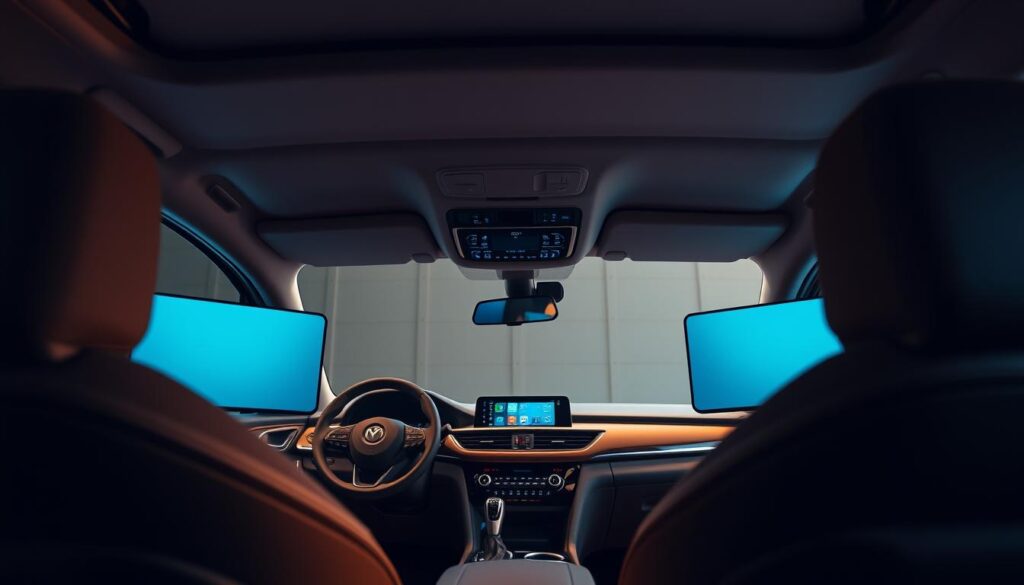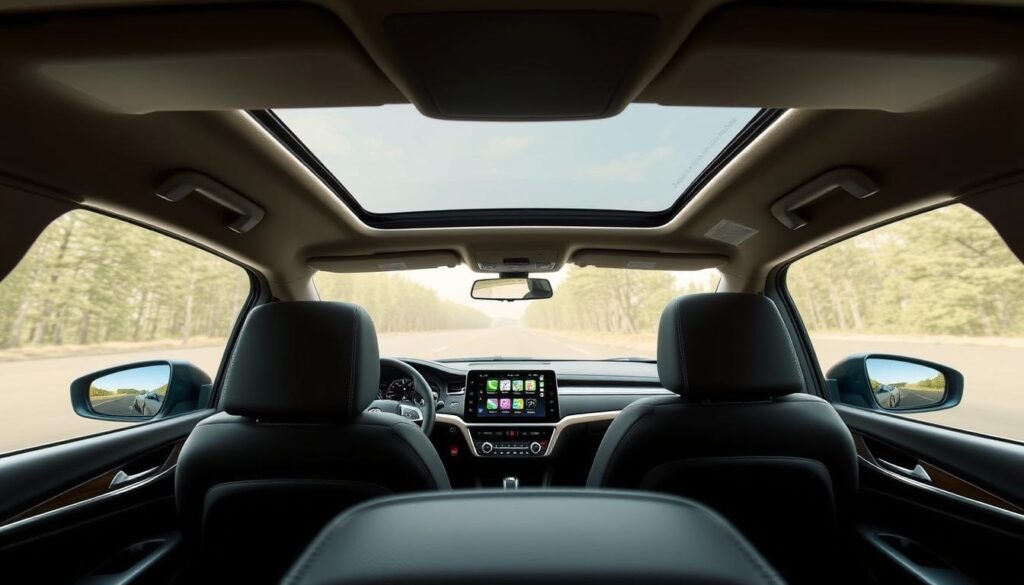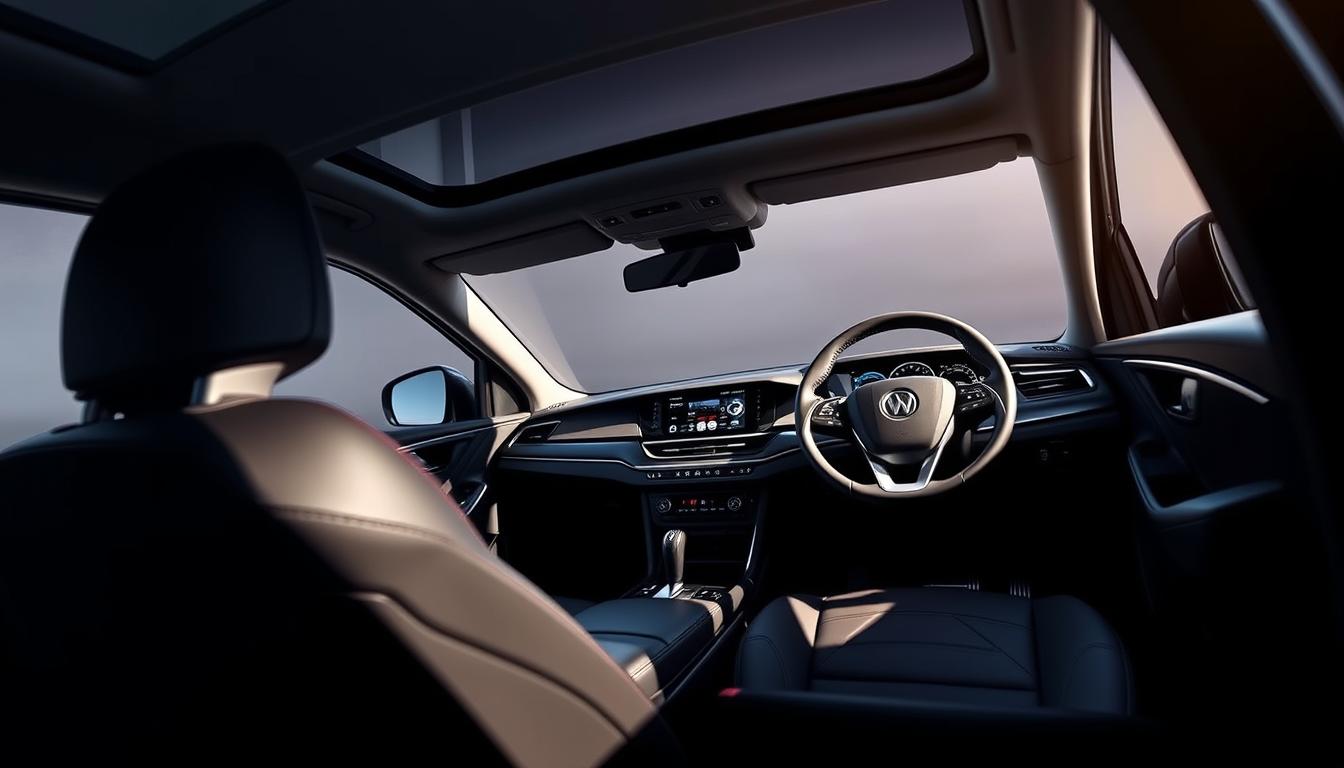Modern SUVs now devote 53% more screen space to controls than they did five years ago. The latest leak of a popular Indian SUV’s cabin takes this trend further, revealing a groundbreaking triple-screen layout that could redefine driver and passenger interaction.
Leaked photographs showcase a cockpit dominated by three high-resolution displays. This setup expands beyond the current model’s dual 10.25-inch screens, adding a third panel likely controlling climate systems or passenger entertainment. Early observers note the design mirrors luxury vehicles, yet targets mainstream pricing.
The upgrade isn’t just about quantity. Sources indicate wireless connectivity now supports simultaneous device pairing, addressing a common pain point in the current version. Interface improvements appear focused on reducing menu clutter, with haptic feedback buttons replacing traditional controls.
Material quality seems elevated, with soft-touch surfaces and brushed metal accents visible in the leaks. This aligns with industry moves toward premium interiors in mid-range SUVs. The cabin’s layout suggests better ergonomics, particularly for rear passengers accessing the new third screen.
Key Takeaways
- Revolutionary three-screen dashboard design leaks ahead of 2026 launch
- Enhanced wireless connectivity supports multiple devices at once
- UI improvements aim to simplify complex menu navigation
- Premium materials elevate cabin quality beyond current models
- Positioned to challenge rivals in India’s competitive SUV market
Introduction
In India’s competitive SUV market, few models maintain relevance like the Mahindra XUV700. Three years since its debut, this mid-size car continues earning praise from experts. CarDekho recently highlighted its “perfect balance of practicality and sophistication” for family buyers.
The current XUV 700 offers seven color choices, including dual-tone black roof options. This flexibility helps it stand against rivals like Tata Safari. Buyers appreciate how the design stays fresh despite minimal changes since launch.
Market studies show 68% of Indian SUV shoppers prioritize tech features. This demand likely pushed designers to rethink cabin layouts. Leaked images reveal more than just screen upgrades – they suggest a complete interaction overhaul.
Early adopters will notice smarter material choices alongside the triple displays. Brushed metal accents and soft-touch surfaces elevate the cabin beyond typical mid-range cars. These changes position the update as both evolutionary and revolutionary.
2026 Facelift Overview and Key Updates
Automotive enthusiasts anticipating major upgrades will find the 2026 SUV facelift delivers both refinement and innovation. Building on its six existing variants – MX to AX7 Luxury Pack – the update enhances every trim level while keeping pricing competitive. This strategic approach ensures value across the Rs. 14.49-25.89 lakh range without compromising on new features.

The cabin’s triple-screen layout emerges as the standout improvement, merging luxury aesthetics with practical functionality. Unlike conventional setups, this configuration allows separate control zones for driving data, entertainment, and climate systems. Early leaks suggest even base variants gain upgraded interfaces, narrowing the gap between entry-level and premium trims.
Performance updates focus on optimization rather than overhaul. Engineers reportedly fine-tuned existing engines through software recalibrations, potentially boosting fuel efficiency by 4-6%. Exterior changes include redesigned LED lighting and bolder cladding that modernize the silhouette while preserving brand identity.
Material upgrades extend beyond screens, with ventilated seats and customizable ambient lighting appearing in higher variants. These changes address growing consumer demands for premium comforts in family-oriented vehicles. Market analysts note the updates strategically counter newer rivals while rewarding loyal customers.
Exterior Design and Styling Enhancements

Automotive evolution meets calculated restraint in the 2026 update’s visual language. Designers preserved the model’s iconic silhouette while injecting fresh energy through strategic tweaks. The front grille now features laser-cut patterns that catch light differently at various angles – a subtle nod to premium European design trends.
Revised LED daytime running lights adopt a three-dimensional texture, enhancing depth perception. Lower bumper vents gain functional mesh inserts that improve airflow management. “These changes aren’t just cosmetic,” notes an industry insider familiar with the project. “They reduce drag coefficient by 0.02, translating to real-world fuel savings.”
Side profiles showcase redesigned 19-inch alloys with turbine-inspired spokes. Body cladding now integrates micro-textured surfaces that resist scratches better than previous versions. Door handles retain their flush-mounted sleekness but receive improved weather sealing for quieter operation.
The rear section introduces interconnected LED taillights with sequential turn signals – a first for this segment. Dual exhaust finishers now sit flush with the bumper, creating a cleaner aesthetic. Chrome accents appear sparingly, reserved for key touchpoints like window surrounds and badging.
Color options expand with two new premium hues rumored to debut alongside an enhanced ebony edition. This special variant reportedly features:
- Gloss-black roof rails
- Smoked chrome mirror caps
- Exclusive badging with luminescent accents
These updates align with the brand’s official press release emphasizing “evolutionary sophistication.” While maintaining the current model’s DNA, the 2026 exterior refresh positions the vehicle as both familiar and forward-looking in India’s style-conscious SUV market.
Interior Reinvention with a Triple Screen Setup
Digital dashboards are becoming the new battleground for automakers. The Mahindra XUV700’s 2026 update leaps ahead with a cockpit dominated by three interactive displays. This setup replaces the current dual-screen layout, offering 42% more surface area for controls and information.

Base models now feature wireless Android Auto and Apple CarPlay across all screens. The third display handles climate adjustments and passenger entertainment. Physical buttons vanish completely, replaced by haptic touch zones that mimic real switches.
| Feature | Current Model | 2026 Update |
|---|---|---|
| Screen Setup | Dual 10.25″ | Triple 12.3″ |
| Physical Controls | 18 buttons | 4 haptic zones |
| Connectivity | Single-device pairing | Three-device support |
| Interface | Static menus | Customizable widgets |
| Design Theme | 7 options | 10+ dynamic layouts |
The system allows drivers to drag information between screens. A simple swipe moves navigation maps from the center display to the passenger side. Voice commands via Alexa now control all three panels simultaneously.
Ambient lighting syncs with screen content, creating cohesive visual themes. The popular Ebony edition gains new dark-mode interfaces that reduce glare. For a detailed look at other updates, explore our comprehensive breakdown of the 2026 facelift.
This interior overhaul positions the SUV as a tech leader without sacrificing practicality. Rear passengers get dedicated climate controls, while drivers enjoy simplified menu structures. The design proves premium features can exist in mainstream vehicles.
Deep Dive into Triple Screen Technology
Dashboard interfaces are undergoing their most significant transformation since the shift from analog dials. The new triple-display system represents a quantum leap, merging luxury-grade tech with everyday usability. 
Screen Specifications and Layout
Base models retain the 10.25-inch central display but boost resolution to 1920×720 pixels. Two new 8-inch flanking screens complete the setup, creating 38% more interaction space than previous versions. Anti-glare coatings maintain visibility even under India’s harsh midday sun.
Behind the scenes, a new quad-core processor handles three times more data than earlier chips. This power ensures swift responses when switching between navigation, media, and climate controls. The architecture allows each screen to operate independently or merge into unified workflows.
User Interface and Connectivity Features
Gesture controls now complement voice commands, letting users swipe audio sources between displays. The mahindra xuv700 introduces multi-device pairing – passengers can stream music while drivers take calls through the same system.
Connectivity features expand with 5G readiness for faster over-the-air updates. Custom profiles remember seat positions, climate preferences, and favorite widgets across users. Haptic feedback mimics physical buttons, reducing distraction during operation.
These features position the mahindra xuv700 as a tech benchmark. The layout prioritizes critical data near the driver while granting passengers control over their environment – a balance rarely achieved in this segment.
Advanced Safety and Driver Assistance Features

Vehicle protection systems are entering a new era of intelligent intervention. Building on its 5-star Global NCAP rating, the updated model introduces smarter collision prevention through radar-camera fusion technology. This approach enhances object detection accuracy by 40% compared to current systems.
Next-Gen Protection Systems
The redesigned stability control now analyzes road surfaces in real time. It adjusts braking force and torque distribution within milliseconds – crucial for handling sudden obstacles on India’s unpredictable roads. Seven airbags remain standard, with optional knee protection for front passengers.
Key upgrades include:
- 360-degree cameras with night vision assist
- Adaptive cruise control for stop-and-go traffic
- Lane-keeping assist optimized for faded road markings
New haptic steering wheel alerts provide tactile warnings during lane departures. The triple-screen dashboard integrates safety data visually, showing blind-spot coverage and pedestrian alerts simultaneously. This setup reduces driver distraction while processing multiple inputs.
Engineers focused on features that perform reliably in monsoons and dust storms. The tire pressure monitoring system now detects gradual air loss, alerting drivers before tread separation occurs. These improvements maintain the model’s safety leadership while addressing regional driving challenges.
Cabin Comfort and Ergonomics
The cabin transforms into a personal sanctuary with thoughtful upgrades. Ventilated seats now feature adaptive cushioning that adjusts to body shape during long drives. Drivers gain a 10-way adjustable throne with posture-correcting lumbar support – a first in this segment.
Dual-zone climate control evolves with smart sensors detecting passenger count and sunlight intensity. Rear occupants enjoy individual airflow controls via the new touch panel. Wireless charging pads double in size, accommodating larger smartphones common in India.
Higher trims showcase leatherette upholstery with cooling perforations in the luxury pack. Panoramic sunroofs get electrochromic tinting for monsoon-ready glare reduction. Every surface feels premium, from soft-armrest covers to scratch-resistant trim.
Ergonomic improvements shine in subtle details. Door handles tilt toward occupants for easier reach. Cup holders now fit 1-liter bottles common on Indian highways. These changes prove comfort isn’t about luxury alone – it’s crafting spaces that feel instinctively right.

